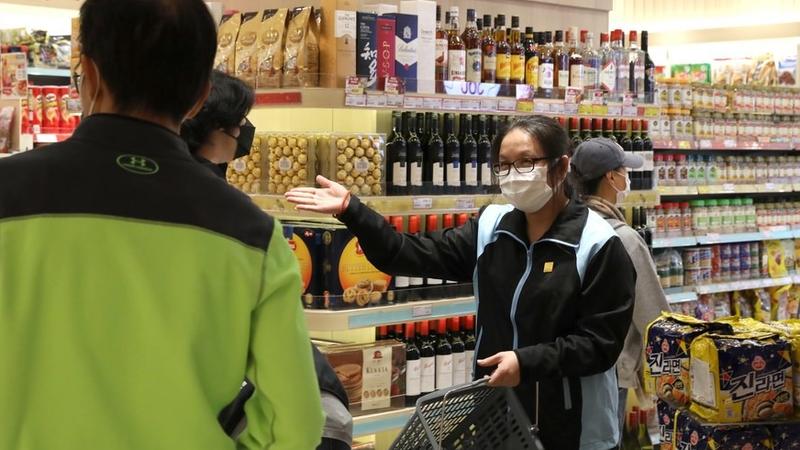 A shop assistant speaks with customers at a retail chain store in Hong Kong, on Dec 28, 2020. (PHOTO / XINHUA)
A shop assistant speaks with customers at a retail chain store in Hong Kong, on Dec 28, 2020. (PHOTO / XINHUA)
Hong Kong’s retail sales rebound is slowing as the city’s retail sector braces for business challenges arising from changes in the consumption patterns of Hong Kong residents and Chinese mainland visitors.
According to the Census and Statistics Department data released on Wednesday, the value of total retail sales in February, provisionally estimated at HK$33.8 billion ($4.32 billion), increased 1.9 percent from a year ago, less than the market forecast of 4.8 percent while it posted 15 consecutive months of expansion.
The value of total retail sales in January was revised to a meagre growth rate of 0.9 percent compared with a year earlier.
For the first two months of 2024, it was provisionally estimated that the value of total retail sales increased 1.4 percent year-on-year, the data showed.
Retailers are now concerned about the issue of rent increases. Some members reported that since the third quarter of last year, some landlords have gradually increased rents at low double-digit level.
Annie Yau Tse, Chairman, Hong Kong Retail Management Association
Among different types of merchandise goods, in the first two months of this year, the value of medicines and cosmetics increased 21.7 percent, followed by books, newspapers, stationery and gifts (20.1 percent), and other consumer goods not classified (10.7 percent).
In the same period, the value of other consumer durable goods not classified decreased 25.1 percent, followed by Chinese drugs and herbs (21.9 percent) and fuel (14.5 percent).
A government spokesman said the government of the Hong Kong Special Administrative Region will continue to monitor the situation when changes in the consumption patterns of residents and visitors pose challenges.
But the spokesman said he was optimistic about the city’s retail sales performance. “As handling capacity continues to recover and more mega events are staged, inbound tourism is expected to revive further and benefit the retail sector. Rising household income and the government’s initiatives in boosting consumption sentiment should also provide support.”
Amid a solid recovery in inbound tourism, Hong Kong’s total retail sales value rebounded 16.2 percent last year whereas the total retail sales value expanded 15.9 percent and 7.8 percent respectively in November and December.
Annie Yau Tse, chairman of the Hong Kong Retail Management Association, says members of the association are relatively pessimistic about the retail sales market performance. “Retailers are now concerned about the issue of rent increases. Some members reported that since the third quarter of last year, some landlords have gradually increased rents at low double-digit level. “
Tse added that according to the association’s survey, only 14 percent of the surveyed members believe that revenues will increase in March, but the increase will only be single or low double digits. Ninety percent of the interviewed members expect business to remain flat or fall, and some members even expect a decline of 20 to 40 percent. For April, less than 10 percent of members expect business to increase, and 80 to 90 percent expect business to decline or remain flat.
Other analysts are worried that the Hong Kong retail sales market is facing structural changes because of changes in consumption patterns.
“The Hong Kong economy is going through a structural change with low volumes of capital market activity, a shift in the visitors coming to the city as low-spending day-trippers, and a diversion of residents to Shenzhen for spending on essentials,” argued Wilson Ling, a credit analyst at S&P Global Ratings.
“Even for the Chinese mainland shoppers that have been returning to Hong Kong, most of these are in and out in a single day, spending moderately. It is not yet a full return to large number of mainlanders buying high-margin items such as jewelry and designer handbags in Hong Kong boutiques, as was the norm of the early 2010 decade,” Ling said.
“We expect consumption sentiment in the near term to be dented by the negative wealth effect resulting from corrections in local equity and housing market, though the sustained recovery of inbound tourism should more than offset the drag on retail sales,” Overseas Chinese Bank (OCBC) Head of Greater China Research Tommy Xie Dongming and OCBC Greater China Economist Cindy Keung Ching said.


